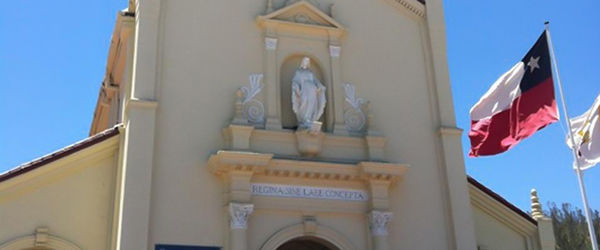At the same altar in St. Peter's Basilica where they were ordained priests exactly 50 years ago, Cardinal William Levada and 17 of his classmates celebrated a Mass of thanksgiving "for the great gift of the priesthood" Dec. 20.
Cardinal Levada, prefect of the Congregation of the Doctrine for the Faith, told the concelebrating cardinals, bishops and priests and several hundred family, friends and seminarians, "We do not anticipate some miraculous appearance again here to celebrate our 100th anniversary, so we ask you to sustain us with your prayers and your friendship in these our final priestly years," he said.
The cardinal, a student at Rome's Pontifical North American College at the time, was ordained with 53 other men at the Altar of the Chair in St. Peter's in 1961. Four of the cardinal's classmates are U.S. bishops and concelebrated the anniversary Mass, including retired Archbishop John Favalora of Miami and Archbishop John Vlazny of Portland, Ore., who were ordained priests with Cardinal Levada. The other concelebrating classmates were Archbishop George Niederauer of San Francisco, who was ordained a priest four months later, and Bishop Tod Brown of Orange, who was ordained in 1963.
Bishops Thomas Doran of Rockford, Ill., and Edward Kmiec of Buffalo, N.Y., also were ordained priests at St. Peter's Dec. 20, 1961, but did not come to Rome for the celebration.
Speaking at the end of the Mass, Cardinal Levada led the 17 in giving thanks to the Lord "for the priesthood we received 50 years ago as a great gift of our loving God."
The homily was delivered by U.S. Archbishop J. Augustine DiNoia, secretary of the Congregation for Divine Worship and the Sacraments.
After listening to the story of the Annunciation from the Gospel of Luke, the archbishop focused on how all believers, but especially priests, must be prepared to respond to God's plan like Mary did, saying, "Let it be done according to your will."
Although she was "the holiest human being who ever lived," Mary still asked the angel Gabriel how it would be possible that she would become the mother of God, he said.
Mary's was "just the sort of reaction we all have when confronted with the news that God is about to do something unexpected. Our natural reaction is, 'But I'm not ready.' In Mary's case, the angel in effect dismisses her hesitation by affirming that what is about to happen does not depend on her readiness, but on the grace at work already in her," he said.
Archbishop DiNoia said there is no man who prostrates himself on the floor of a church and receives the laying on of hands who doesn't wonder whether he is "ready and worthy" to become a priest, but he is called to follow Mary's example and trust in God, turning himself over to God's will.
The principal concelebrants at the Mass were Cardinal Angelo Sodano, retired Vatican secretary of state, and Cardinal Justin Rigali, retired archbishop of Philadelphia. Like Cardinal Levada, Cardinal Rigali was ordained to the priesthood for the Archdiocese of Los Angeles in 1961, but eight months earlier.
Besides Archbishop Niederauer, Cardinal Roger Mahony, archbishop emeritus of Los Angeles, was ordained to the priesthood four months after Cardinal Levada (on April 30, 1962 at St. Vibiana’s Cathedral, Los Angeles). Cardinals Levada, Rigali and Mahony, Archbishop Niederauer and Bishop Brown are among 27 alumni of St. John’s Seminary, Camarillo, who have served the Church as bishops.
William Joseph Levada was born June 15, 1936, in Long Beach. His great-grandparents immigrated to California from Portugal and Ireland in the 1860s.
A graduate of St. Anthony High School, Long Beach (1954) and St. John's Seminary College (1958), he was sent to Rome for formation studies at the North American College. He later earned a doctorate in theology at Gregorian University in Rome. He was ordained in St. Peter's Basilica as a priest of the Los Angeles Archdiocese Dec. 20, 1961.
He worked in Los Angeles as an associate pastor (St. Louis of France, La Puente, and St. Monica, Santa Monica), teacher (St. Monica High School) and campus ministry chaplain and returned to Rome in 1976 as a staff official of the doctrinal congregation. During his six years of service there, he continued teaching theology part-time at Gregorian University.
On his return to California in 1982 he was named secretary of the California Catholic Conference, the public policy agency of the state's bishops. He was made an auxiliary bishop of Los Angeles in 1983 and three years later was named archbishop of Portland, Ore., where he served until 1995 when he was named archbishop of San Francisco.
He had spent some 30 years working closely with the doctrinal congregation, and was serving as chair of U.S. bishops' Committee on Doctrine when, on May 13, 2006, he was named to head the congregation by Pope Benedict XVI, the former congregation chief who had become pope only the month earlier following the death of Pope John Paul II.
Cardinal Levada celebrated his 75th birthday in June. Bishops who reach the age of 75 are required to offer the pope their resignation, but the pope often keeps his closest aides on longer.
His appointment as prefect of the doctrinal congregation in May 2005 was the first major appointment Pope Benedict XVI made after his election, and the California native was the first to be created a cardinal by Pope Benedict in 2006.
Cardinal Levada is the first U.S. prelate to head the congregation, the Vatican's oldest, and is considered primary in responsibility and influence. In addition to keeping a watch over Catholic faith and morals, promoting studies through the International Theological Commission and the Pontifical Biblical Commission, the congregation is responsible for reviewing the handling of clerical sex abuse cases and dealing with accused priests.

